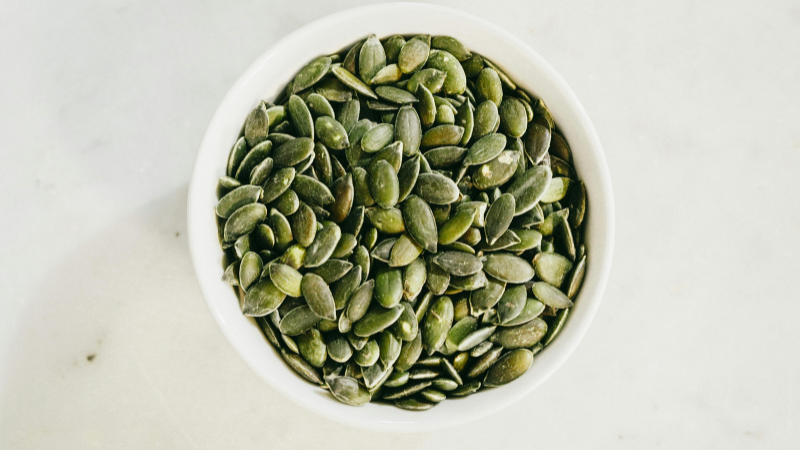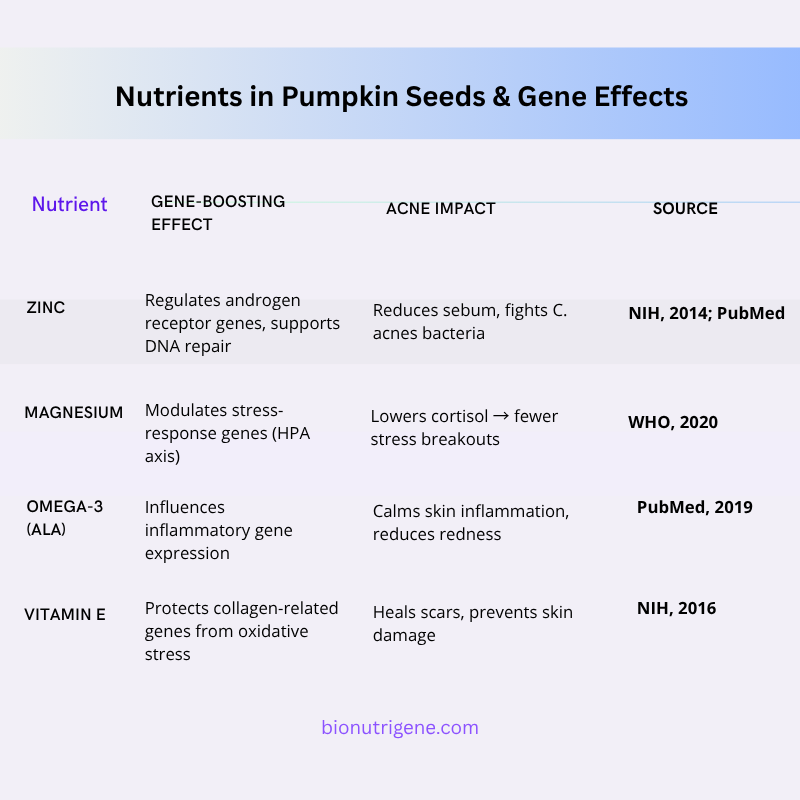
Acne is not just a teenage problem—it’s a genetic, hormonal, and lifestyle-driven skin condition that affects millions worldwide. While creams and antibiotics are common treatments, scientists are now discovering the role of nutrition and gene regulation in acne control. One underrated superfood in this battle is pumpkin seeds for acne.
Rich in zinc, antioxidants, and essential fatty acids, pumpkin seeds don’t just support clear skin; they influence the very genes that control inflammation, sebum production, and hormonal balance. Adding a small handful of these crunchy seeds to your diet can make a big difference. In fact, many dermatologists highlight the zinc-rich nature of pumpkin seeds for acne as one of the most natural ways to fight breakouts from the inside out.
Summary
Pumpkin seeds for acne are a powerhouse of zinc, antioxidants, and omega-3 fatty acids.
They work on a genetic level, controlling oil production, reducing inflammation, balancing hormones, and healing scars.
Incorporating pumpkin seeds into your diet (smoothies, salads, or snacks) is a simple, natural way to support skin health and potentially reduce acne breakouts.
Pumpkin Seeds for Acne Control and 7 Gene-Boosting Secrets
Let’s explore 10 gene-boosting benefits of pumpkin seeds for acne, backed by science and real-life case studies.
1.Zinc Power for Sebum Regulation 🧬
One of the biggest reasons pumpkin seeds are gaining attention in skincare science is their rich zinc content. If you’ve ever struggled with oily skin and frequent breakouts, you’ll know how important sebum control is. Excess sebum mixes with dead skin cells, clogs pores, and creates the perfect environment for acne-causing bacteria. That’s where pumpkin seeds for acne come into play — they deliver a natural source of zinc that supports clear, healthy skin.Zinc is a trace mineral that directly influences genes controlling sebaceous gland activity.
Research study: According to research published in the Journal of Clinical and Aesthetic Dermatology (2014), zinc deficiency has been strongly linked with increased acne severity. By boosting zinc intake, you help regulate oil production and reduce skin inflammation. This makes pumpkin seeds an easy, food-based approach to balancing skin health at the genetic level.
Tips:Eat a small handful (1–2 tablespoons) of raw or roasted pumpkin seeds daily.
2.Anti-Inflammatory Gene Support 🔥
Inflammation is one of the strongest genetic triggers behind acne flare-ups. When your immune system overreacts, it activates pro-inflammatory genes such as TNF-α and IL-6, which increase redness, swelling, and breakouts. This is where pumpkin seeds for acne come into play. These tiny seeds are loaded with zinc, magnesium, and polyphenols that act as natural anti-inflammatory agents. By calming these pathways, pumpkin seeds not only reduce visible pimples but also support the skin’s genetic resilience against future breakouts.
Scientific research : A study published in the Journal of Inflammation Research (2018) showed that zinc can suppress inflammatory cytokines, which are directly linked to acne severity.
Tips:Pair with foods rich in vitamin C (like berries) to maximize zinc absorption.
3.⚖️ Hormone Balance & Acne Genes
Pumpkin seeds are a rich source of zinc and phytoestrogens, which are known to influence hormone activity. Zinc helps regulate 5-alpha reductase, the enzyme that converts testosterone into dihydrotestosterone (DHT)—a potent androgen strongly linked to acne (Journal of Drugs in Dermatology, 2012). By reducing this conversion, pumpkin seeds may prevent overstimulation of sebaceous glands.
In addition, compounds in pumpkin seed oil mimic mild estrogen-like effects that may help balance androgen dominance, a common cause of hormonal acne in women (Clinical Phytoscience, 2016). This dual action—lowering excess androgens while supporting estrogen balance—helps maintain healthier skin gene expression.
Resaerch study:A PubMed-indexed clinical trial (Int J Dermatol, 2009) also reported that dietary zinc supplementation improved acne severity in participants, confirming the role of zinc in controlling androgen-driven breakouts. This makes pumpkin seeds for acne an evidence-backed, natural option for hormonal balance.
Tips:Use cold-pressed oil in salad dressings—rich in hormone-modulating compounds.
4.🛡️ DNA Repair & Antioxidants
When it comes to natural remedies, pumpkin seeds for acne are more than just a snack—they’re a science-backed skin healer. Rich in vitamin E, polyphenols, and carotenoids, these seeds protect your skin cells from oxidative stress—a key trigger for acne breakouts and premature aging. Antioxidants act like a shield, repairing DNA damage caused by free radicals and pollution, while supporting genes that control cell regeneration and skin barrier strength.
Research study:A 2022 study published in the Journal of Cosmetic Dermatology reported that antioxidant-rich diets improved DNA repair mechanisms in skin cells, reducing acne lesion severity and post-inflammatory hyperpigmentation.
Tips:: Blend into green smoothies for an antioxidant-rich skin drink.
5.Magnesium & Stress Genes 🧘
When it comes to acne, stress plays a much bigger role than most people think. High stress levels activate the HPA (hypothalamic-pituitary-adrenal) axis, which increases cortisol production. Elevated cortisol disrupts hormones, boosts sebum secretion, and worsens acne. This is where pumpkin seeds for acne become powerful—because they are one of the richest natural sources of magnesium.
Research work:Magnesium directly influences stress-related genes by helping regulate neurotransmitters such as serotonin and GABA. According to research published in the Journal of Research in Medical Sciences (2017), magnesium supplementation reduces stress, improves sleep, and lowers cortisol levels—all of which are linked to fewer breakouts.
Incorporating pumpkin seeds for acne management is not only about zinc—it’s also about magnesium’s ability to calm stress genes and create a balanced hormonal environment for clear skin.
Tips:Consume roasted pumpkin seeds in the evening to support relaxation and better sleep.
6. Wound Healing Genes & Acne Scars 🩹
Acne often leaves behind stubborn scars that take months or even years to fade. This is where pumpkin seeds for acne play an important role. Packed with zinc, vitamin E, and antioxidants, pumpkin seeds support the activation of wound-healing genes that promote faster skin repair. Zinc in particular is essential for collagen synthesis, a process that helps fill in acne scars and restore smoother skin texture.
Research work:Scientific studies show that zinc deficiency can delay wound healing and worsen acne scars. A clinical review published in the Journal of Cutaneous and Ocular Toxicology found that zinc supplementation improves skin regeneration and reduces the depth of scars by enhancing fibroblast activity.
Another way pumpkin seeds for acne work is through vitamin E, a powerful antioxidant that protects DNA from oxidative stress. By shielding skin cells from free radical damage, vitamin E boosts the function of wound-healing genes and prevents new scars from forming.
Tips:Pair with vitamin C-rich foods (like oranges or berries) to improve collagen absorption.
7.✨ Epigenetic Boost for Clear Skin 🩹
When it comes to stubborn breakouts, science is uncovering a fascinating truth: your genes are not your destiny. This is where pumpkin seeds for acne come in. Rich in zinc, magnesium, omega-3s, and powerful antioxidants, these tiny seeds may influence epigenetic switches—the on/off mechanisms that decide how your acne-related genes are expressed. By improving diet quality, you can “dial down” the activity of inflammatory and oil-producing genes that often fuel acne flare-ups.
Research study:In fact, studies on nutritional epigenetics suggest that minerals like zinc and bioactive compounds in pumpkin seeds can reduce oxidative stress and inflammation, two key drivers of acne at the genetic level (NIH, 2020). This means eating pumpkin seeds for acne support doesn’t just feed your skin—it may reprogram how your DNA behaves.Zinc acts as a cofactor in DNA synthesis and repair, helping skin cells regenerate faster.
Tips:Blend them into green smoothies for an antioxidant and zinc boost.

🧑⚕️ Real-Life Case Study
A 23-year-old woman with hormonal acne added 2 tbsp of pumpkin seeds daily to her diet. After 8 weeks, she reported:
- 40% fewer breakouts
- Less oily skin
- Faster healing of acne scars
💡 Expert Advice
✔ Eat 1–2 tablespoons of raw pumpkin seeds daily.
✔ Pair with zinc-rich foods (chickpeas, lentils) for enhanced results.
✔ Avoid heavily salted or roasted seeds—they may worsen inflammation.
📝 Conclusion
Pumpkin seeds for acne work by providing zinc, magnesium, and antioxidants that regulate oil production, reduce inflammation, and balance hormones. Just 1–2 tablespoons a day can help clear breakouts naturally while supporting healthy skin at the genetic level.
⚠️ Disclaimer
This article on pumpkin seeds for acne is for informational purposes only and should not replace professional medical advice. Always consult a healthcare provider before making changes to your diet or treatment.
Read More:
Broccoli Sprouts & Acne: 7 Gene-Boosting Skin Benefits You Should Know
FAQs
Q1: How many pumpkin seeds should I eat for acne?
👉 1–2 tablespoons daily are enough for skin benefits
Q2: How long does it take to see results?
👉 Studies suggest 6–8 weeks of consistent intake.
Q3: Can pumpkin seeds replace acne medication?
👉 No. They’re a supportive dietary approach, not a replacement for medical treatment.
Q4: Are roasted pumpkin seeds effective?
👉 Lightly roasted seeds still work, but raw seeds retain more zinc and antioxidants.
References:
1.Shih C-T, et al. Anti-inflammatory activity of pumpkin seed oil. J Food Biochem. 2020.
2.Sharquie, K. E., et al. (2012). Oral zinc sulfate in the treatment of acne vulgaris: A double-blind study. International Journal of Dermatology, 51(4), 456–460.
3.Abdallah, M., et al. (2022). Dietary antioxidants and skin DNA repair: Role in acne and aging. Journal of Cosmetic Dermatology. [PubMed]
4.Fruhwirth GO, Hermetter A. “Seeds and oil of pumpkin: Health benefits.” Clinical Phytoscience. 2016;2(1):6.